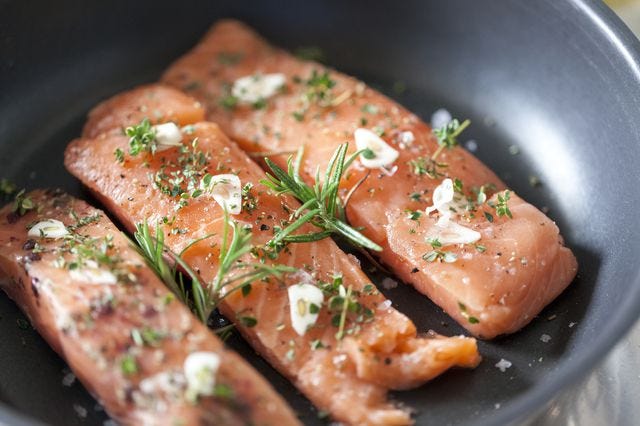People Who Eat Lots of Seafood Have More Sex, Says Science Just another reason to add more fish to your diet! ( courtecy;- by Alisa Hrustic )
People Who Eat Lots of Seafood Have More Sex, Says Science
Just another reason to add more fish to your diet!
- In a recent study, couples who ate more than two weekly servings of fish had more sex and found it easier to conceive.
- Women tend to avoid fish before pregnancy, due to concerns surrounding mercury levels.
- Most fish consumed by Americans is low in mercury and safe to eat.
You already know that fish is a great source of protein, vitamin D, and heart-healthy omega-3 fatty acids. Another surprising perk? It could give your sex life a boost—and even help you get pregnant—according to a new study from the Harvard T.H. Chan School of Public Health.
For the study, 501 couples who were trying to conceive logged their daily seafood intake—including fish and shellfish—in a journal for four years. They also tracked how often they had sex. The researchers followed the pairs for a year or until they became pregnant.
They found that men and women who consumed more than two servings of seafood per week while trying to get pregnant had more sex than those who consumed less seafood. They also got pregnant faster, even when the researchers adjusted for the rates of sexual activity.
In fact, 92 percent of the couples who enjoyed fish and shellfish more than twice a week were pregnant by the end of one year. Men and women with the highest seafood intake—more than eight servings per month—had a 22 percent higher rate of getting it on, too.
But was the fish making them feel frisky? Well, the study authors aren’t entirely sure. You may have heard that shellfish and oysters could potentially amp up your libido due to their high zinc content (despite scientific evidence confirming this is true), but because the researchers didn’t measure zinc in this study, they couldn’t really trace it back to that link, explains study author Audrey Gaskins, ScD, a research associate in the department of nutrition at Harvard T.H. Chan School of Public Health.
“It is also possible that couples who consume higher amounts of seafood together share more meals, and thus more time together (including nights),” she adds.
As for the rise in baby rates? The omega-3 fatty acids in fish could improve semen and embryo quality, up the likelihood of ovulation, and boost levels of progesterone (a sex hormone involved in pregnancy), Gaskins explains.
That’s a big deal since women often feel the need to avoid fish before and during pregnancy, due to concerns surrounding mercury levels, she adds. However, pregnant women should actually be eating more fish, since omega-3s are essential to prenatal development.
Americans in general just don’t eat enough seafood. The U.S. Dietary Guidelinesrecommends eating 8 ounces of fish per week—but most of us only down 2.7 ounces per week, according to USDA data. It’s also important to note that 90 percent of the fish consumed by Americans is low in mercury and perfectly safe to eat, according to the Food and Drug Administration. (Check out this chart to learn which fish have the highest mercury content so you can steer clear.)
And obviously, having more sex—whether you want to have a kid or not—is a great thing. Not only does it help you feel more connected to your partner, but research also shows that sex is good for your heart, improves your cancer risk, and can help you de-stress (you probably already knew that last part).
Bottom line: Your body and your fertility may benefit when you eat more seafood. Ready to give it a go? We love this honey mustard salmon and roasted asparagus, these tuna stuffed peppers, and these fish fillets with summer squash.

মন্তব্যসমূহ
একটি মন্তব্য পোস্ট করুন